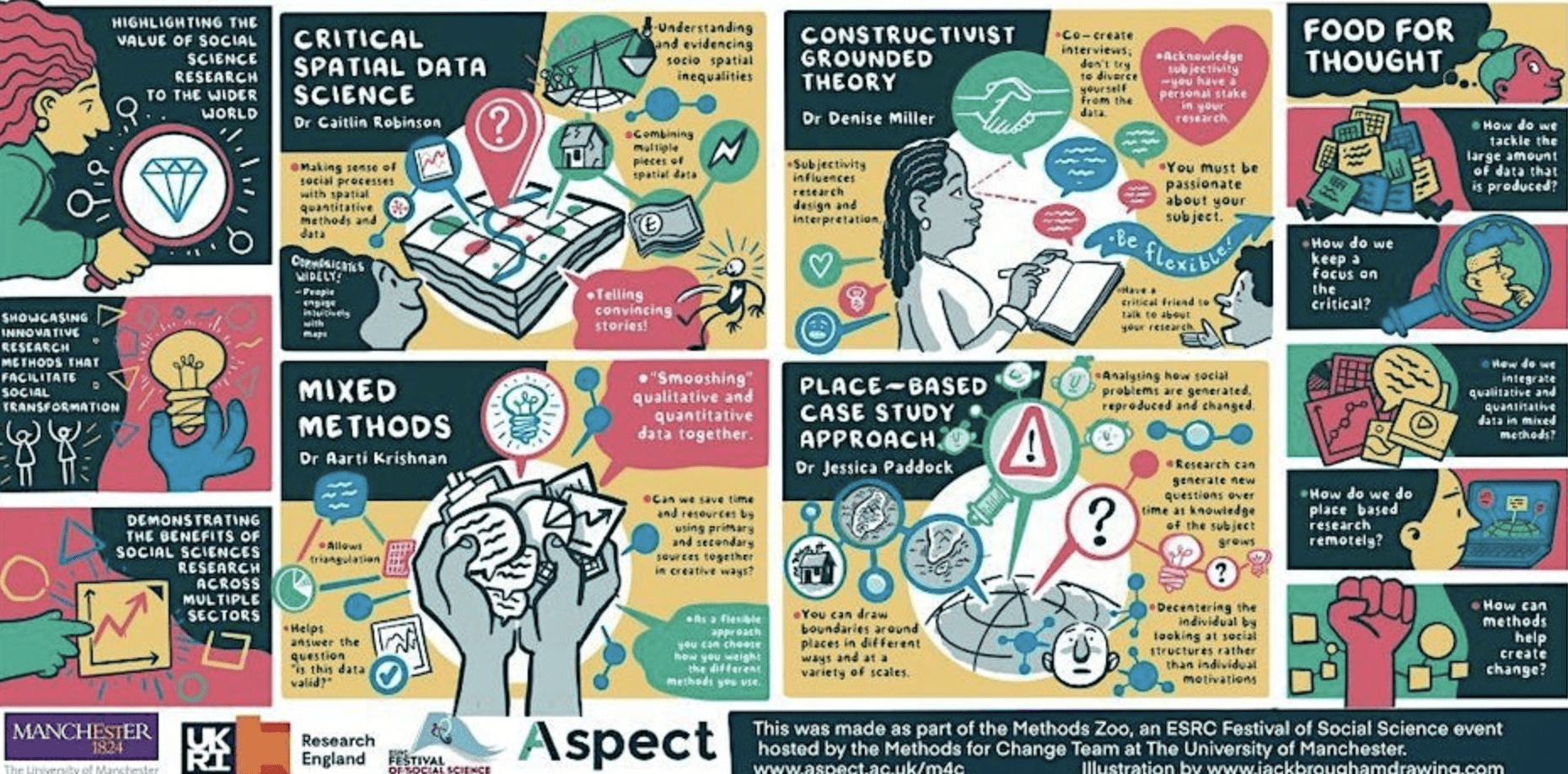Methods for Change Showcase Event – 12th May
Creative Methods Zoo: Early Career Researcher Networking Event
12th May 10am-11am BST
Chair: Dr Laura Pottinger, The University of Manchester
Early Career Researchers were invited to think creatively about the methods used in research in this networking event, which asked: If your research method were an animal, what would it be?
Participants were encouraged to reflect on this question in advance, and to join the session prepared to explain the qualities, abilities, personalities and quirks that characterise your method/animal. In the session, contributing academics from the Methods for Change project shared ‘method animals’ in small group discussions with fellow researchers from across the social sciences. All animals that feature in the zoo were be illustrated by Jack Brougham.
Places were limited and open to researchers from social science disciplines who defined themselves at an early stage of their career. We particularly welcomed submissions and attendance from underrepresented groups in line with The University of Manchester equality and diversity policy.
Hosts:
- Dr Stephanie Sodero, Humanitarian and Conflict Response Institute, The University of Manchester
- Prof. Penny Tinkler, Sociology, The University of Manchester
- Dr Jennie Middleton, Transport Studies Unit, University of Oxford
- Sawyer Phinney, The University of Manchester
Panel 1: Transforming Communities
12th May 11am-12pm BST
Chair: Dr Amy Barron, The University of Manchester
This panel explored the role of social science methods in understanding, exploring, and moving forward with communities. Communities are arguably more important than ever, functioning as vital infrastructures of care and support, helping to tackle the range of challenges the 21st Century presents. It is vital not only to take stock of our communities and the diverse things that matter to them, but to also think about what kind of communities we want to move towards and what this might require.
Centrally we asked: what role can social science methods play within and beyond the academy in transforming communities?
Panel:
- Dr Jenna C. Ashton, Art History and Cultural Practices, The University of Manchester
- Dr Megan Blake, Human Geography, The University of Sheffield
- Julie McCarthy, Greater Manchester Combined Authority
- Jon Hutchinson, Groundwork
Panel 2: Social Science Methods for Environmental Change
12th May 12pm – 1pm BST
Chair: Dr Alison Browne, The University of Manchester
This panel explored the role of social science and social science research methods in understanding, exploring, and addressing complex socio-environmental change. We heard from two Government Social Researchers (GSRs) – Dr Beth Brockett (Natural England) and Dr Jess Phoenix (Defra) – whose job it is to collate and communicate evidence from social science into policy making (see Phoenix et al., 2019). We also heard from two academics – Dr Matt Watson (Change Points toolkit, University of Sheffield) and Dr Joanne Tippett (Ketso, University of Manchester) – whose work and collaborations have had a wide range of impacts and influence on environmental sector stakeholders in the UK and beyond.
In this session we asked: what role can social science methods play within, and beyond, the academy in articulating and addressing complex socio-environmental change?
Panel:
- Chair: Dr Ali Browne, Human Geography, University of Manchester (M4C Co-PI)
- Dr Jessica Phoenix, Head of Floods and Water Research, DEFRA (Department of Environment, Food and Rural Affairs)
- Dr Beth Brocket, Senior Specialist – Behavioural and Social Sciences, Natural England
- Dr Joanne Tippett, Spatial Planning, The University of Manchester
- Dr Matt Watson, Human Geography, The University of Sheffield
Panel 3: 1pm – 2pm: Methods to Explore Socio-Economic Inequalities
12th May 1pm – 2pm BST
Chair: Dr Sarah Marie Hall, The University of Manchester
This panel explored the role of social science methods in understanding, exploring, and addressing socio-economic inequalities.
In a time of distinct socio-economic change, social science methodologies are needed more than ever to understand the inequalities that such change produces. Whether global financial crises, austerity, welfare reform or more recently the COVID-19 pandemic, social and economic lives around the world are somewhat defined by change. This change operates at various scales, and interconnects with multifarious environmental, political and cultural processes.
In this session we asked: what role can social science methods play within and beyond the academy in articulating and addressing socio-economic inequalities?
Panel:
- Dr Sara Reis, Women’s Budget Group
- Mr Patrick Myers, Department for Work and Pensions
- Dr Lucy Jackson, Sheffield Methods Institute, The University of Sheffield
- Prof Jude Robinson, Institute of Health & Wellbeing Social Sciences, University of Glasgow
Panel 4: Creative Outputs Exchange Panel
12th May 2pm-3pm BST
Chair: Dr Ulrike Ehgartner, The University of Manchester
There is growing interest in creative and visual techniques for communicating social sciences research and methods, galvanised by the research impact agenda, alongside a renewed sense of responsibility to the communities we work with. Academics are increasingly engaging with video, film, cartoons, zines, visual minutes, podcasts, printmaking, animation, and more to communicate their research to, or collaborate with, diverse audiences.
In this session artists, creatives and academics involved in the Methods for Change project engaged with the following question: do some artworks and artforms work better with communicating social science research, methods and outputs?
Panel:
- Alastair Lomas, The University of Manchester
- Nell Smith, Artist and Printmaker
- India Joseph, Illustrator
- Prof. Nik Brown, Sociology, University of York
- Dr Cheryl McGeachan, Human Geography, University of Glasgow
- Prof Stephen Linstead, Management, University of York




